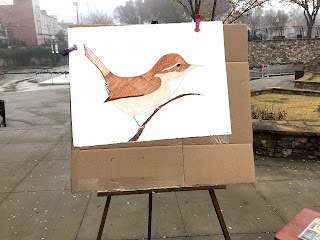Madam Butterfly/The Birth and Life of Opera
In regards to Madam Butterfly, I was presently surprised after watching it. I didn't think a film adaptation of an opera could quite strike me like this one did, especially since it's short film that portrays the characters as puppets. It is good at evoking emotion, particularly when Butterfly is seen waiting in the same spot all alone for Pinkerton to return. I could almost feel her loneliness just watching the scene. And then she finds happiness in having her child, and it stays that way until Pinkerton finally returns. I actually found myself feeling aghast after he just took her child without a problem. It made me wonder: how could he do that? Butterfly's distress really got to me, and it was upsetting to see her disassemble herself at the end all because of what happened. Another thing that really resonated with me was the music that played throughout the film. I'm not one to listen to opera, but I really appreciated it as I watched the film. It was very beautiful and really set the tone for the film, like it was bringing everything together. It was a perfect example of how powerful music can be when used in cinema.
As for "The Birth and Life of Opera," I have never been quite so fascinated with the history and origins of this particular type of theatre. It was very intriguing to see how it's creation unfolded, especially when I learned that the concept did not take very well when it was first introduced. I also wasn't aware that the idea of opera came to be as early as the late 1500s, so I was rather surprised upon hearing it. The Camerata and the works of Monteverdi were new to me too, as I was only familiar with later composers such as Verdi, Mozart, and Wagner due to being in an orchestra, so learning about them and how they helped develop opera was very interesting. I particularly liked to see how opera impacted the society and culture of cities as it became more popular through the years, especially because it went on to portray real-life events such as the French Revolution and Nixon's visit to China. It even played with the idea of politics. All in all, watching the video honestly made me appreciate opera more, and I really wouldn't mind watching it or listening to it more now that I have a better understanding of it.
As for "The Birth and Life of Opera," I have never been quite so fascinated with the history and origins of this particular type of theatre. It was very intriguing to see how it's creation unfolded, especially when I learned that the concept did not take very well when it was first introduced. I also wasn't aware that the idea of opera came to be as early as the late 1500s, so I was rather surprised upon hearing it. The Camerata and the works of Monteverdi were new to me too, as I was only familiar with later composers such as Verdi, Mozart, and Wagner due to being in an orchestra, so learning about them and how they helped develop opera was very interesting. I particularly liked to see how opera impacted the society and culture of cities as it became more popular through the years, especially because it went on to portray real-life events such as the French Revolution and Nixon's visit to China. It even played with the idea of politics. All in all, watching the video honestly made me appreciate opera more, and I really wouldn't mind watching it or listening to it more now that I have a better understanding of it.

Comments
Post a Comment